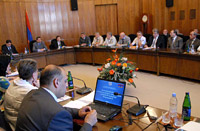While we were trying to get used to the International Monetary Fund’s prediction concerning 5 per cent fall of the domestic economy, the representative of the IMF in Armenia Ninke Omes told other bad news and informed that this recession may exceed the prediction of 5%.
“There are a number of factors, most of which are connected with Russia. In this country the processes are much worse that anyone could expect. Furthermore, the ongoing process of deepening the crisis will impact Armenia as well,” said N. Omes to the radio Liberty two days ago. It seems that our government agrees with the estimations of the IMF. At least there has been no opinion to deny that there will be 5% economic recession in Armenia. Two months ago on March 11 the prime minister of Armenia said the following: “Yes, we foresee a 4.5% or zero growth in Armenia, or 1-2% or 4.5% fall. We have taken all scenarios into consideration.” At that time we wrote that the fifth scenario would be the most possible one. Alas, this prediction will come true and even the economic recession will be higher. In fact the only honest man in the government is the prime minister because the other ones either did not understand what was happening or understood but did not want to tell people about it.
Three days ago president Serzh Sargsyan said the following during the fifth summit of Armenia’s Union of Producers and Businessmen: “Alas, the expectations of economic processes that we had in the end of the previous year mostly came true in the beginning of 2009.” Pay attention to what he said: the expectations that we had in the end of the previous year. In fact they knew about it yet in the end of last year. However it did not prevent the CB from making a prediction on January 20 of this year that the GDP of our country would grow by 7-8% during this year (when the other expectations had almost fully come true already). Gagik Minasyan, the head of the NA standing commission on budget and financial affairs, referred to his professional calculations and said that the crisis would still continue for a half year and then would stop and the economy would grow again. Shortly the head of the RPA faction Galust Sahakyan said, “Our economy will grow this year too. It will never be zero.” It is also important to pay attention to the fact that in parallel with highly negative expectations the mentioned positive announcements were made by high rank officials. Neither of them has been even demonstratively punished for misinforming people (see the chart). Yes, Galust Sahakyan was true to say that the economic growth in our country would not equal to zero because it will be less than zero. The IMF reports that Armenia suffered most from the crisis in the region. The biggest reason why the impact of crisis on Armenia’s economy was so high is Armenia’s dependence from the Russian economy. It turns out that the same thing our government has been proud of during the past years did not help us at all.
This chart brings a highly negative picture of Armenia’s economy not only because it predicts more than 5% fall of the Armenian economy, but because Armenia is in the last place in this list. For instance, Tajikistan, which economy grew at 0.8% in 2007 (when Armenia’s economic growth was reported at 13.8%), will increase its GDP by 2% this year, and next year by 3%. This year only Kazakhstan and Armenia will have negative economic development, and next year all the other economies will grow except for our economy (even the economy of Uzbekistan will grow). This is humiliating. It does not mean that we don’t want the other countries to develop. The problem is that we don’t understand the announcements of the IMF and other relative institutions saying that Armenia is resisting the influence of the crisis successfully. Do you imagine what would happen if it did not resist? Whatever they say the impression is that the international organizations are trying not to discourage us. The worst thing is that they still continue doing that and they encourage the government’s policy but fail to answer to the most important question: how does it come that a country, which has had double digit growth during the past years, is resisting the crisis successfully, the government is doing everything properly, but still it is the only country in the region that will have zero economic growth next year? In other words, what is the advantage of Georgia or Tajikistan enabling them grow next year? Both these countries are not rich of energetic resources, neither of them had even the half of economic growth rate that we had. Or, does the IMF believe our government so much that is eager to make so many compliments?

